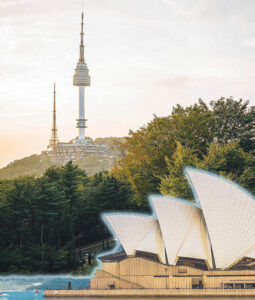
Australia and South Korea: Steadfast partners, real friends
As the year 2023 draws to a close, we look back at what happened this year and conclude that the geopolitical and geoeconomic risks that the Philippines faces have become more complex than ever.
Specifically, we saw how a coercive, antagonistic, and belligerent state continued to assert its dominance in an area already established by international law as belonging to the Philippines. There was a laser pointing incident, water cannon incidents, a collision, and the installation of floating barriers, among others. The destruction of our coral reefs as a result of marine adventurism also came to light. In response to such acts, the Philippines has filed a total of 54 diplomatic protests to say we are not taking these incursions sitting down.
More importantly, we have been strengthening our ties with like-minded nations who share the same ideals and values as we do. After all, maintaining peace and stability in the Indo-Pacific region is also in their interest. In fact, it is in the interest of any nation that believes in fairness and decency, and that respects the rule of law.
The Philippines has been fortunate for the overwhelming support of these countries, among which are the Republic of Korea and Australia. These countries are among those who have unreservedly expressed their support for the Philippines’ victory as contained in the July 2016 ruling of the Permanent Court of Arbitration (PCA), which said that the so-called nine-dash line being claimed by China in fact has no legal basis.
Then again, our valuable allies are doing so much more aside from uttering heartening expressions of support for the PCA decision. Their support is seen in the many ways they cooperate with the Philippines in many aspects of security, not just in the defense of our territory.
On Nov. 28, the Stratbase ADR institute held back-to-back forums with South Korea and Australia, discussing the many ways our countries are cooperating and how we can fortify these partnerships moving forward.
Next year, we will commemorate the 75th year of our diplomatic relations with the Republic of Korea — an opportunity to reflect on the depth of our shared history. Robust diplomatic and economic ties are complemented by the in-person meetings of Philippine President Ferdinand Marcos, Jr. and Korean President Yoon Suk Yeol in November 2022 and September 2023, promising to elevate ties into a strategic partnership in the future.
Cooperation between the Philippines and South Korea has been in at least two areas. In the maritime environment, the initiatives “Enhancement of Marine Litter Management in Manila Bay” and “Reducing Marine Plastics in the East Asian Seas Region” are being implemented respectively by the Korea International Cooperation Agency (KOICA) and Partnership in Environment Management for the Seas of East Asia (PEMSEA). Meanwhile, maritime security and defense cooperation is shown by the Korean navy’s participation in the 2023 Pacific Partnership in the Philippines, the acquisition of Korean-made naval/patrol vessels by the Philippines, and the collaboration between the coast guard agencies of the two countries that will further intensify next year.
During the Nov. 28 forum, Lee Sang-Hwa, the Korean Ambassador to the Philippines, said: “Cementing rules-based order in this region is key to taking a leap forward for Korea and the Philippines. As the Philippines seeks to become an upper middle-income country and Korea aspires to be included in the G7+ group, securing a stable and thriving maritime architecture has become vital for both countries.”
“Our strategic partnership is more than just an agreement between states,” said Undersecretary Maria Theresa Lazaro of the Department of Foreign Affairs. “It is a reaffirmation of our connection. It is an acknowledgment that despite geographical distances, the links that unite us are as tenacious.”
The articulation of support and reiteration of commitment to peace and stability were also the main themes of the forum with Australia.
“These are consequential times for the Indo-Pacific region,” said Dr. Moya Collett, Australian Deputy Head of Mission to the Philippines.
A significant development in the 77-year-old Philippine-Australia relation was the elevation of the two countries’ bilateral partnership to a strategic partnership during the visit of Australian Prime Minister Anthony Albanese to Manila in September this year. Exercise Alon, part of Australia’s Indo-Pacific Endeavor 2023, was also concluded in August.
“Like the Philippines, Australia will continue to call for adherence to UNCLOS (United Nations Convention on the Law of the Sea) because it provides the foundation for peace, security, and stability in the maritime domain,” Dr. Collet said.
Admiral Ronnie Gil Gavan, Commandant of the Philippine Coast Guard (PCG) emphasized that maritime cooperation among countries is not limited to capacity and equipment, and a country can only win if it is supported by a strong industrial base. He described the PCG’s civil maritime programs in the West Philippine Sea.
Next year and in the years to come, new security challenges are sure to emerge or intensify. As we confront existing and evolving risks, the national interest must remain paramount in our policy implementation. These same risks provide the impetus for greater cooperation among nations who share the same values, and, yes, destiny in this interconnected, multi-polar world.
We are thankful for partners like South Korea and Australia. We are confident that we will be able to meet whatever new challenges or variations may emerge with the help from our steadfast, committed, like-minded friends.
Victor Andres “Dindo” C. Manhit is the president of the Stratbase ADR Institute.



